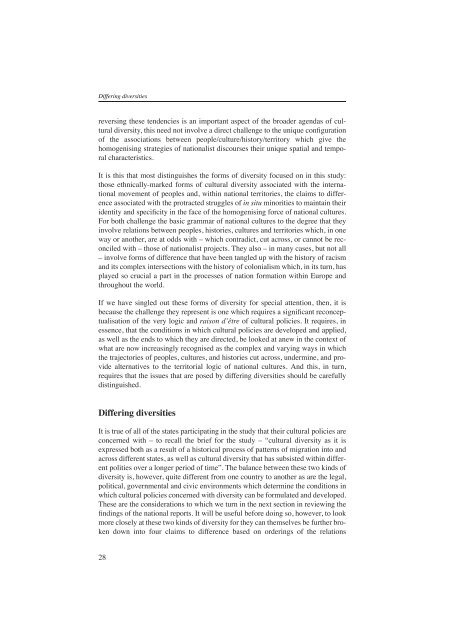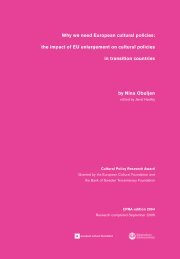Tony Bennett, Differing diversities - Council of Europe
Tony Bennett, Differing diversities - Council of Europe
Tony Bennett, Differing diversities - Council of Europe
Create successful ePaper yourself
Turn your PDF publications into a flip-book with our unique Google optimized e-Paper software.
<strong>Differing</strong> <strong>diversities</strong>reversing these tendencies is an important aspect <strong>of</strong> the broader agendas <strong>of</strong> culturaldiversity, this need not involve a direct challenge to the unique configuration<strong>of</strong> the associations between people/culture/history/territory which give thehomogenising strategies <strong>of</strong> nationalist discourses their unique spatial and temporalcharacteristics.It is this that most distinguishes the forms <strong>of</strong> diversity focused on in this study:those ethnically-marked forms <strong>of</strong> cultural diversity associated with the internationalmovement <strong>of</strong> peoples and, within national territories, the claims to differenceassociated with the protracted struggles <strong>of</strong> in situ minorities to maintain theiridentity and specificity in the face <strong>of</strong> the homogenising force <strong>of</strong> national cultures.For both challenge the basic grammar <strong>of</strong> national cultures to the degree that theyinvolve relations between peoples, histories, cultures and territories which, in oneway or another, are at odds with – which contradict, cut across, or cannot be reconciledwith – those <strong>of</strong> nationalist projects. They also – in many cases, but not all– involve forms <strong>of</strong> difference that have been tangled up with the history <strong>of</strong> racismand its complex intersections with the history <strong>of</strong> colonialism which, in its turn, hasplayed so crucial a part in the processes <strong>of</strong> nation formation within <strong>Europe</strong> andthroughout the world.If we have singled out these forms <strong>of</strong> diversity for special attention, then, it isbecause the challenge they represent is one which requires a significant reconceptualisation<strong>of</strong> the very logic and raison d’être <strong>of</strong> cultural policies. It requires, inessence, that the conditions in which cultural policies are developed and applied,as well as the ends to which they are directed, be looked at anew in the context <strong>of</strong>what are now increasingly recognised as the complex and varying ways in whichthe trajectories <strong>of</strong> peoples, cultures, and histories cut across, undermine, and providealternatives to the territorial logic <strong>of</strong> national cultures. And this, in turn,requires that the issues that are posed by differing <strong>diversities</strong> should be carefullydistinguished.<strong>Differing</strong> <strong>diversities</strong>It is true <strong>of</strong> all <strong>of</strong> the states participating in the study that their cultural policies areconcerned with – to recall the brief for the study – “cultural diversity as it isexpressed both as a result <strong>of</strong> a historical process <strong>of</strong> patterns <strong>of</strong> migration into andacross different states, as well as cultural diversity that has subsisted within differentpolities over a longer period <strong>of</strong> time”. The balance between these two kinds <strong>of</strong>diversity is, however, quite different from one country to another as are the legal,political, governmental and civic environments which determine the conditions inwhich cultural policies concerned with diversity can be formulated and developed.These are the considerations to which we turn in the next section in reviewing thefindings <strong>of</strong> the national reports. It will be useful before doing so, however, to lookmore closely at these two kinds <strong>of</strong> diversity for they can themselves be further brokendown into four claims to difference based on orderings <strong>of</strong> the relations28














